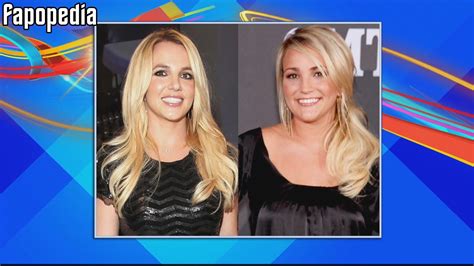Jamie Lynn Spears Nude

The topic of Jamie Lynn Spears' nude images has been a subject of interest and controversy, especially in the context of her younger sister, Britney Spears', public struggles and the #FreeBritney movement. In this article, we will delve into the specifics of this issue, exploring the context, the impact, and the implications it holds.
The Context: Jamie Lynn Spears and Her Journey

Jamie Lynn Spears, the younger sister of pop icon Britney Spears, has walked a unique path in the entertainment industry. Born on April 4, 1991, in McComb, Mississippi, Jamie Lynn began her career at a young age, appearing in various television shows and films. Her most notable role was in the Nickelodeon series Zoey 101, which ran from 2005 to 2008.
However, Jamie Lynn's journey took an unexpected turn when, at the age of 16, she became pregnant with her daughter, Maddie. This revelation led to a hiatus from her acting career and a period of relative seclusion from the public eye. During this time, she focused on her personal life and raising her child.
Fast forward to recent years, Jamie Lynn has re-emerged in the public sphere, making appearances and promoting various projects. Her name, however, has often been linked to the controversies surrounding her sister, Britney Spears, and the #FreeBritney movement, which advocated for Britney's freedom from her conservatorship.
The Nude Images and Their Impact

In the digital age, where privacy is often compromised, celebrities and public figures are not exempt from the risk of having their personal images leaked or distributed without consent. This is precisely what occurred with Jamie Lynn Spears.
In 2020, a series of nude images of Jamie Lynn were allegedly leaked and circulated online. These images, reportedly taken years ago, sparked a wave of attention and scrutiny. While it is unclear how these images were obtained or distributed, the incident highlighted the ongoing issue of privacy invasion and the potential exploitation of celebrities' personal lives.
The impact of such incidents can be profound. For individuals in the public eye, the loss of privacy and the potential for their personal moments to be exploited can lead to significant emotional distress and trauma. In Jamie Lynn's case, the incident added another layer of complexity to the already delicate narrative surrounding her family and the #FreeBritney movement.
The Legal and Ethical Dimensions
The circulation of intimate images without consent is not just a matter of privacy invasion; it also carries legal and ethical implications. In many jurisdictions, the non-consensual distribution of intimate images is considered a criminal offense, often falling under the category of revenge porn or cyber harassment.
From an ethical standpoint, the distribution of such images without consent raises questions about respect for an individual's dignity and autonomy. It also underscores the need for greater digital literacy and awareness about the potential consequences of sharing or accessing such content.
Addressing the Issue: Jamie Lynn’s Response
In response to the circulation of her nude images, Jamie Lynn Spears took a proactive approach. She addressed the issue directly, acknowledging the invasion of her privacy and expressing her frustration and disappointment.
"I am deeply saddened and frustrated by the recent invasion of my privacy and the distribution of highly personal and private photos that were taken of me years ago," Jamie Lynn said in a statement.
"The illegal distribution of these private photos is a deeply personal and emotional issue for me, and I am heartbroken that my personal photos have been stolen and shared publicly without my consent. I have taken legal action to address this issue and protect my rights, and I ask for your support and respect for my privacy during this difficult time."
Jamie Lynn's response underscores the importance of taking a stand against such invasions of privacy and the need for individuals to protect their personal boundaries, especially in the digital realm.
The Broader Implications: Privacy and Consent in the Digital Age
The incident involving Jamie Lynn Spears’ nude images sheds light on a broader issue: the erosion of privacy in the digital age.
With the proliferation of social media and the ease of sharing content online, personal boundaries and consent have become increasingly complex issues. The concept of "private" has evolved, and individuals must navigate a digital landscape where their personal lives can be exposed and exploited without their consent.
Protecting Privacy: Tips and Strategies
In light of the challenges posed by the digital age, here are some tips and strategies to help protect your privacy and maintain control over your personal images and information:
- Be mindful of what you share online: Think twice before posting or sharing personal images or information. Once something is shared online, it can be difficult to control its distribution.
- Use strong privacy settings: Take advantage of privacy settings on social media platforms and apps. Limit the visibility of your posts and personal information to trusted individuals only.
- Secure your devices: Use strong passwords and enable two-factor authentication on your devices and online accounts. This adds an extra layer of security and makes it harder for unauthorized individuals to access your personal data.
- Educate yourself: Stay informed about the latest privacy settings and features on various platforms. Regularly review and update your privacy preferences to ensure your information is protected.
- Report and take legal action: If you become a victim of intimate image distribution or any form of online harassment, report it to the appropriate authorities. Many jurisdictions have laws in place to protect individuals from such invasions of privacy.
The Future of Privacy: A Collective Effort
Protecting privacy in the digital age is not solely an individual responsibility. It requires a collective effort from policymakers, technology companies, and society as a whole.
Stricter regulations and enforcement of laws related to privacy and consent are necessary to hold individuals and entities accountable for their actions. Additionally, technology companies must prioritize user privacy and implement robust measures to protect personal data.
As individuals, we must also foster a culture of respect for privacy and consent. By being mindful of our own actions and advocating for the rights of others, we can contribute to a digital environment that values and protects personal boundaries.
Conclusion: A Call for Respect and Responsibility
The circulation of Jamie Lynn Spears’ nude images serves as a stark reminder of the challenges we face in the digital age. It underscores the importance of respecting individual privacy and consent, especially in the public eye.
As we navigate an increasingly digital world, let us strive to be mindful of our actions and the impact they may have on others. By prioritizing privacy and consent, we can create a safer and more respectful online environment for everyone.
What are the legal implications of distributing intimate images without consent?
+Distributing intimate images without consent can have severe legal consequences. It is often considered a criminal offense and may fall under laws related to revenge porn, cyber harassment, or invasion of privacy. Penalties can include fines, probation, and even imprisonment.
How can individuals protect their privacy online?
+Individuals can protect their privacy online by being mindful of what they share, using strong privacy settings on social media, securing their devices with strong passwords and two-factor authentication, and regularly reviewing and updating their privacy preferences.
What role do technology companies play in protecting user privacy?
+Technology companies have a significant responsibility in protecting user privacy. They should prioritize user privacy in their product design, implement robust data protection measures, and provide transparent and accessible privacy settings for users.



